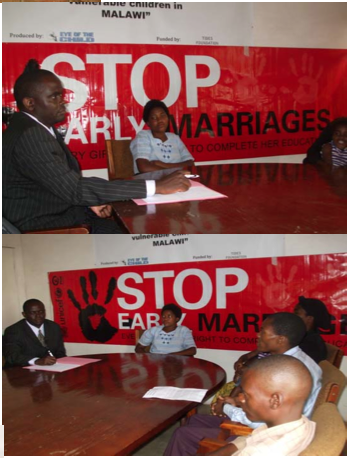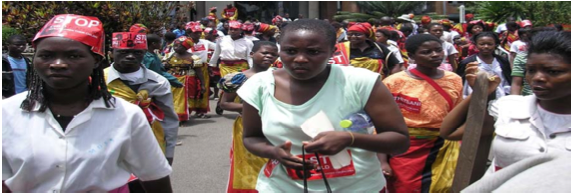Ending Child Marriage in Malawi
In Malawi, 47% of girls are married before the age of 18. In rural areas, girls as young as 12 are sometimes married. Child marriage results in many negative outcomes for girls: they often stop going to school, are not able to complete their primary or secondary education and start having children of their own, which can lead to major health risks. By having children, the chances of a young girl returning to school or learning a skill in order to support herself and her family, are greatly reduced if not eliminated. But Firelight grantee-partners are working to change this.
Elizabeth Makomo, was forced into marriage by her mother, just days after completing her primary school certificate examinations. Thanks to a program initiated by Eye of the Child (EYC) in 2009, she was able to seek out free legal aid to end the marriage. EYC was successful, and at 16 Elizabeth was able to return to school and pursue her dream of becoming a nurse. EYC has successfully advocated in support of children in 47 cases of forced marriages, 13 cases of arranged marriages, and rescued 21 children from early marriages.
EYC is working together with Foundation for Community Support Services (FOCUS), and Nkhotakota AIDS Support Organization (NASO) to change national policies in order to end child marriage in Malawi. By joining together to advocate to the national parliament, they hope to amend laws to change the legal age of marriage from 16 to 18—a first step to improving the livelihoods of adolescent girls and young women in Malawi. They are also advocating for the government to provide educational and economic alternatives to child marriage—making education compulsory, especially for girls. Staff of EYC/FOCUS say, “Girls who stay in school tend to be more empowered, marry late and are more aware of the reproductive health consequences of early pregnancies.”
EYC and FOCUS have gone a step further to include children in the discussion of early marriage, recently organizing a children’s forum. Children discussed the issue of child marriage and the impact it has on their lives. The majority agreed that a 16 year old was too young to get married. They recommended that the legal age should be raised to as high as 21. After hearing from children themselves, our partners participated in a national-level Adolescent Girls Advocacy Conference in September 2012. This included major stakeholders from the government, civil society, media, and the donor community. From this, the issue of child marriage has become a critical issue on the national agenda.
Our partners have been inspired to take action on the issue of child marriage, as they see the hardships it places on young girls everyday. Their persistent and collaborative work has paid off, as they have received national attention for their community-level efforts. Additionally, they are well poised to affect significant change because of the respect they have earned as advocates for this impactful cause. We applaud EYC, NASO, and FOCUS for their directed efforts, and are excited to see what their work will mean for the future of girls in Malawi.



